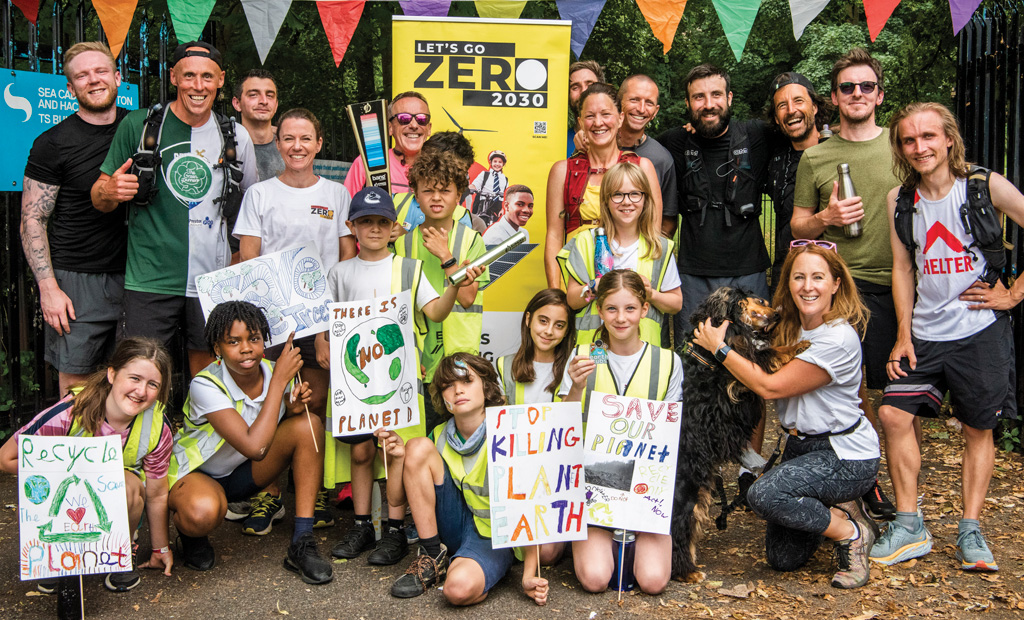Most children think adults aren’t doing enough to address climate change
The climate crisis is a pressing issue for all parents. Safeguarding our children’s future means assessing our impact on the planet and taking measures to minimise it.
In her book Parenting on Earth (MIT Press, 2023), philosopher and mum Elizabeth Cripps argues that to do right by our children, parents must take action to address the issues caused by climate change that threaten our children’s health, livelihoods and human rights.
Families can adopt eco-friendly practices at home, such as reducing our meat consumption, minimising driving and flying, and being mindful of purchases. But what action can parents take to help their schools go greener? A single voice may go unheard, but a group of parents can wield greater influence. By uniting parents to rally behind environmental causes, PTAs can play a crucial role in sparking positive behaviour change.
Schools under pressure
Schools are responsible for a significant amount of carbon emissions and the Department for Education has highlighted the urgent need to reduce the sector’s environmental footprint. The government’s 2022 sustainability strategy identified several key focus areas, including reducing emissions from education buildings, providing climate education and opportunities for students to participate in the transition to net zero, enhancing biodiversity, improving air quality and increasing access to nature on school sites.
To this end, school leaders are under increasing pressure to take action against climate change, but teachers often face a lack of support and resources for environmental projects they want to run.
Start a conversation
The busy headteacher is not necessarily the best person for the PTA to approach. Many schools already have a designated sustainability lead (the government has mandated that by 2025, every school must have one), so seek out this person and open up a dialogue. Let them know that the PTA is willing to support policies and projects that aim to reduce emissions and promote environmental conservation.
Small changes, big wins
Let’s Go Zero is a nationwide initiative that brings teachers, pupils and parents together to offer practical solutions to schools that want to take action on climate change and achieve zero carbon emissions by 2030. More than 2,500 schools have already joined the campaign. Former PTA chair and head of Let’s Go Zero Alex Green acknowledges that the large expensive retrofit projects schools need to do are out of the reach of most PTAs. However, she says: ‘Even smaller, relatively affordable retrofit works can make a difference to the amount of energy the school uses, creating a more comfortable environment to work and learn.’ PTAs can fund, or contribute to, projects such as fitting thermostats on radiators and installing solar film or shades on windows to avoid overheating. They can also work with the school to implement energy-saving measures, such as turning lights off and reducing water usage.
Building on tried-and-tested fundraisers such as clothing recycling schemes and pre-loved uniform sales, PTAs can tackle the substantial amount of food waste schools produce by starting recycling and composting projects.
Furthermore, schemes that promote biodiversity in nature are always popular with parents and pupils. Green suggests PTAs get involved with initiatives that create and maintain green spaces within the school premises, for example, forest schools and woodland areas.
PTAs can also fund workshops that encourage eco-friendly practices for pupils (see p48 of PTA+ magazine spring 2024).
WWF UK’s Schools Sustainability Guide, developed with Let’s Go Zero, is an excellent resource for groups who need inspiration for practical climate-related projects. It focuses on seven key areas: biodiversity, energy, waste and recycling, paper and printing, water, food and food waste, and travel.
Spread your message
The PTA can spend its funds as it sees fit, so don’t be afraid to seek clarification about the environmental impact of any purchases the school requests. For example, if you agree to buy laptops, ask about the charging mechanisms, energy efficiency and if there is a more sustainable alternative. Establish a PTA purchasing policy to guide your decisions and effectively communicate your message to the community. Look at who handles your money. Can you open an account with a more ethical bank?
Travel wisely
Getting to and from school by car can be a stressful experience for everyone. Cars crowding side streets and parked illegally make it less safe for pupils trying to cross the road, and vehicle emissions expose children to harmful pollutants. Research shows that 57% of primary-age pupils live within a mile of their school, and 52% of secondary-age pupils live within two miles. Travelling actively to school by walking, scooting or cycling means pupils are more likely to achieve the daily recommended hour of physical activity and encourages them to build good habits for life.
Sustrans, the UK’s walking and cycling charity, promotes active travel to school for children and families in two ways: by working directly with schools and through national campaigns. In schools, Sustrans officers work with the local authority, staff and parents to develop policies and address barriers to active travel.
Chris Bennett, head of behaviour change at Sustrans, says it’s not about blaming the parents for driving but finding a solution that can work for everyone. ‘Children are actually really keen to travel actively to school and driving often doesn’t work for parents either, because sitting in traffic for half an hour doesn’t get you anywhere fast.’
Sustrans offers practical training in cycling and scooter skills and works with parents to plan active journeys. Schools can also implement the School Streets programme, where traffic is restricted near the school gates for a short time each day.
The PTA can support active travel by funding resources that make it an easier option. Bennett explains: ‘Lots of schools still don’t have somewhere safe, dry and easily accessible for pupils to keep their bikes and scooters during the day. Providing this parking is one of the things we find has the greatest impact.’
Other schemes include purchasing bicycles for use during PE lessons or creating cycle libraries where families borrow bikes on a short-term basis. To encourage walking, PTAs can establish a Park and Stride, where parents can park easily and walk the rest of the way to school or organise working parties to clean up overgrown footpaths and make them more accessible.
Don’t go it alone
PTAs can work with their schools to participate in national campaigns such as Sustrans’ Big Walk and Wheel (held in March) and Cycle to School Week (held in September). Any school can join these campaigns to help raise awareness of active travel. Bennett notes: ‘Last year’s Big Walk and Wheel created more than two and a half million active journeys, saving 1,335 tonnes of CO2 and 2,984kg NOx emissions if the journeys logged had otherwise been made by car.’
PTAs can even use active travel as a fundraiser by organising sponsored bike rides and walks to school.
Expand your horizons
It doesn’t have to stop there – beyond the school gates, PTAs can engage with the wider community by working with local charities and campaigning groups, encouraging participation in tree-planting drives, rewilding projects and clean-up campaigns.
Resources
LET’S GO ZERO
IKEA X LET’S GO ZERO SCHOOL COMPETITION: Share a video of your school’s innovative projects to boost sustainability for the chance to win up to £2,000 of sustainability kit.
SCHOOLS ACTION FOR CLIMATE MONTH (7 JUNE–7 JULY): Celebrate the work being done to combat climate change and biodiversity loss by participating in a range of challenges and activities.
CLIMATE ACTION ADVISERS: A team of real people who assist with projects, from helping embed a sustainability lead to drawing up a climate action plan or carrying out a zero-carbon audit.
THE OVO FOUNDATION NATURE PRIZE (OCTOBER 2024 TBC): Schools can win one of ten prizes of £1,000 or 15 prizes of £200 to bring creative and engaging projects to life.
SUSTRANS
Schools should speak to their local authority to find out if a Sustrans schools officer can work with them.
BIG WALK AND WHEEL (MARCH): This year marks the 15th Big Walk and Wheel, a campaign that inspires pupils to make active journeys to school and improve air quality in their neighbourhood.
CYCLE TO SCHOOL WEEK (SEPTEMBER): Celebrate the fun and freedom of an eco-friendly cycle school run by taking part in this initiative organised by Bikeability and Sustrans.
FRIDEDAYS BIKE BUS: Help children start the day right by organising a bike bus where families ride to school together.
ECO-SCHOOLS:
Earn an Eco-Schools Green Flag by participating in this seven-step framework that empowers young people to make a difference. eco-schools.org.uk
ENERGY SPARKS:
Using electricity, gas and solar data, Energy Sparks shows how much energy the school is using and suggests actions the school community could take to save energy and reduce its carbon emissions. energysparks.uk
MEAT-FREE MONDAYS:
Encourage pupils to eat more healthily and learn about the global impact of their food choices. meatfreemondays.com
SAVE OUR WILD ISLES:
Find out how your school can help protect and restore nature with free tools and resources from the WWF and RSPB. saveourwildisles.org.uk/schools
SOLAR FOR SCHOOLS:
Action-based learning about energy, environment, regeneration and decarbonisation using solar panels. solarforschools.co.uk/about/vision
VEOLIA’S SUSTAINABLE SCHOOLS:
Free programmes from environmental solutions company Veolia that encourage pupils to lead sustainability projects. veolia.co.uk/schools
READ the government’s schools’ sustainability and climate change policy paper: tinyurl.com/3b7u7ta6
DOWNLOAD WWF UK’s Schools Sustainability Guide: wwf.org.uk/get-involved/schools/sustainability-guide







